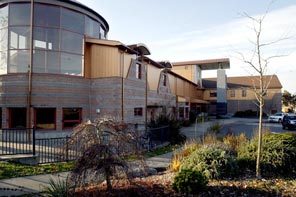Excerpt From an Open Letter to Arne Duncan from Herb Kohl
We have come far from that time in the '60s. Now the mantra is high expectations and high standards. Yet, with all that zeal to produce measurable learning outcomes we have lost sight of the essential motivations to learn that moved my students. Recently I asked a number of elementary school students what they were learning about and the reactions were consistently, "We are learning how to do good on the tests." They did not say they were learning to read.
It is hard for me to understand how educators can claim that they are creating high standards when the substance and content of learning is reduced to the mechanical task of getting a correct answer on a manufactured test." (Summer 2009)
Nova High School Relocated

Merit Pay
Laurie, in response to R. Weingartner, On Point, 1/26/10
Merit pay is an issue that is closely associated with charter schools and is a reiteration of the No Child Left Behind Act.
Basically, it requires that teachers pay be based on how well their students perform on standardized tests. For our students, it could be the new MAP test. With the No Child Left Behind Act, teachers and staff were pressured to teach much of the class work to the standardized tests. With so much focus on the test, many other parts of knowledge building, creativity and understanding of subjects and their synthesis with other knowledge had to take a back seat. For many students, teaching to a test meant that they were not able to reach their full potential which would have been far beyond the level of the tests.
No one wins in this situation.
Part of the fallout also is that if a teacher's pay is based on how well their students test, many teachers will want to teach in a school where they know that the students will perform well. Those schools are, for the most part, not the schools that are predominately minority in population.
Some students do not perform well on standardized tests for many different reasons and yet a teacher's pay can be tied to that student's performance. High stakes testing also puts pressure and stress on the students who become burdened with the thought that they need to perform well on one test. The test becomes a focus with little opportunity to explore and have fun learning, creating and synthesizing new thoughts and ideas.
Update: The Governor of Texas has decided to opt out of the Race to the Top funding because of the ineffectiveness of the merit pay program that was in effect for three years inthe state.
Update: March 8, 2010 Principal to be removed from school in Wasington State due to low WASL scores.
What Is a Charter School?
A charter school can expel any student that it doesn't believe fits within its standards or meets its level of expectation in terms of test scores. If the student is dropped off the rolls of the charter school, the money that was allotted for that student may or may not be returned to the district at the beginning of the next year. That is dependent upon the contract that is established by each district.
Also, according to a recent (June 15, 2009) study by Stanford University's Center for Research on Education Outcomes (CREDO), charter schools do not necessarily perform any better than public schools. In fact, 37 percent performed worse. Forty-six percent demonstrated "no significant difference" from public schools. Only 17 percent of charter schools performed better than public schools.
Thomas Jefferson
The Broad Foundation
The Broad Foundation claims to be a philanthropic organization, created by billionaire Eli Broad.
The Broad Foundation supports privately run charter schools and actively develops a system of charter schools in urban areas.
Broad claims it engages in "venture philanthropy":
"Our Approach to Investing: Venture Philanthropy. We take an untraditional approach to giving. We don't simply write checks to charities. Instead we practice 'venture philanthropy.' And we expect a return on our investment."
Many of us have discovered the Broad Foundation's presence within SPS and are requesting an explanation for why it is here and what its' objectives are.
Seattle has three "Broad Residents", and two Broad graduates now working within SPS. One of them is our superintendent who is a graduate of the Broad Academy which trains superintendents, and is also on the Broad's Board of Directors.
Another Broad graduate and a onetime Broad resident in SPS, Brad Bernatek, is now Director of REA, Research, Evaluation and Assessment within SPS. That department is responsible for student statistics including enrollment, demographics, evaluation and standardized testing.
The Broad Foundation provided Dr. Payzant, also a Broad graduate, to be a part of our superintendent’s yearly review in 2009.
Broad recently gave SPS a $1M "gift." That money is now in the hands of the Alliance for Education and no one knows how the money is being spent.
All in all the Broad Foundation has been quite generous to the Seattle Public School system and as Eli Broad states himself, he expects a return on his investment.
Broad also supports and actively promotes mayoral control of school districts. Eli Broad's preferred model of mayoral control means that the mayor selects the school board members and superintendent who are therefore unelected and are beholden only to the mayor, not the people of the city. It then becomes a school district that is run by one person, the mayor, with heavy influence by the Broad Foundation through developed relationships with that individual.
Update: A Detroit School District employee found accepting money from the Broad Foundation.
"Let the games begin: Detroit Teachers vote to unanimously join the current Detroit Public School District in their suit against Robert Bobb".
Update: The Broad - Rhode Island connection.
Rhode Island has had the dubious distinction of making national news recently for the draconian firing/scapegoating of an entire school of teachers. Is it a coincidence that the new education commissioner for R.I., who is pushing the state to do whatever it takes to qualify for federal "Race to the Top" dollars, is a "Broad Superintendents Academy" graduate, Deborah Gist?
Dan Weil
Dollars and Sense
December, 2009
What the Gates Foundation Is Doing: The MAP Test
The Gates Foundation supports, and pays for, high stakes testing which is tied to merit pay.
The Bill & Melinda Gates Foundation has given Seattle Public Schools a total of $9M this year for additional testing. We have not been able to find out the details of this testing yet. We don't know what the test is, what the test is to determine, who is administering the test and how the results of the tests are to be used.
UPDATE: We have heard that the Gates "gift" is funding the new computerized, standardized "MAP" tests the district is administering this year to all students, from as young as kindergarten to grade 9. MAP stands for "Measures of Academic Progress™" (yes, it is a trademarked product) and will be administered to the kids three times during the school year. The test can take as much as two hours each session, according to the district's official announcement letter.
A number of questions come to mind: Is this the best use of the students' school time? Is it appropriate to make children as young as five who can't read take a standardized test on a computer? Is this the best use of such funds? Or would parents, students and teachers prefer to see money channeled more directly to the classroom, to create smaller class sizes, more enrichment opportunities, or to purchase new textbooks?
A SIDE NOTE: Another interesting connection is that our superintendent, Dr. Goodloe-Johnson, is on the Board of Directors for the company that has created and distributes the MAP test. There is $4.3M in the levy to pay for additional use of this MAP test in Seattle.
The Cooper Building: Program DIscontinued, 2009

Regarding Arne Duncan's Renaissance 2010
Most of the new experimental schools have eliminated the teacher union. The Commercial Club hired corporate consulting firm A.T. Kearney to write Ren2010, which called for the closing of 100 public schools and the reopening of privatized charter schools, contract schools (more charters to circumvent state limits) and "performance" schools.
Kearney's web site is unapologetic about its business-oriented notion of leadership, one that John Dewey thought should be avoided at all costs. It states, 'Drawing on our program-management skills and our knowledge of best practices used across industries, we provided a private-sector perspective on how to address many of the complex issues that challenge other large urban education transformations.'
Duncan's advocacy of the Renaissance 2010 plan alone should have immediately disqualified him for the Obama appointment."
Henry Giroux & Kenneth Saltman,
Obama's Betrayal of Public Education?
Truthout
The African American Academy: Closed 2009

Alternative Schools in Seattle
At this time, the alternative and nontraditional schools in Seattle are basically under siege. Many schools have been closed, marginalized or split apart, including the Accelerated Progress Program (APP) for highly gifted kids, the Center School, Nova, Summit, the African American Academy, SBOC and AS-1. There is also a plan for an Alternative School Audit by SPS in October, 2009.
We see these alternative programs as viable options to the traditional school approach to education. For this reason many of us believe that with the support of these programs, there is no need for privatized charter schools.
Governor Gregoire and our state representatives are speaking to Arne Duncan about our alternative schools and that they meet the requirement of charter schools and should be considered in providing Race to the Top funds to our state.
Summit K-12: Closed 2009

An alternative school
Please Note
Meg Diaz, a parent, did a brilliant presentation to the school board in January regarding the school closures, the demographics of Seattle and why it didn't make sense to close the schools.
See: http://sites.google.com/site/seattleschoolsgroup/meg-diaz-analysis
Unfortunately, the school board paid no attention to Ms. Diaz or their own reports and instead chose to believe the numbers presented by the superintendent's CFO, Don Kennedy who previously worked with our superintendent in Charleston, and Brad Bernatek our Broad graduate and Director of REA, Research, Evaluation and Assessment who also handles the demographic data for SPS.
Two schools were closed that, per their own report, would see an increase in school aged children of anywhere between 31%-100% between 2008 and 2012. See page 11 of the DeJong report titled "Seattle Public Schools: Enrollment Projections Report". Those two schools were TT Minor Elementary School and Meany Middle School.
After the closures, Ms. Diaz decided to investigate the administrative cost within the Stanford Center and came up with surprising results. While the superintendet was rifing teaches and staff and closing schools, staff was growing within the Stanford Center and particularly in our superintendent's office where yet another Broad graduate was hired as one of the superintendent's administrative assistants.
Posted on October 6, 2009: The new assignment plan just came out and the proposal is to re-open five school buildings. Between closing five school buildings, shuffling students to different schools and now proposing the re-opening of five buildings within a year's time speaks volumns about the lack of competency of our superintendent and her chosen staff.
We have now wasted money closing five schools, moving students, equipment and materials around just to re-open five school buildings.
The cost of re-opening five of these buildings is as follows:
Sand Point: $7M
Viewlands: $11M
Old Hay: $7.5M
Mc Donald$: $14.9M
Rainier View: $7.4M
Total so far: $47.8
The superintendent, along with the school board, plan to take the next capitol levy money, BEX III, to be voted on in 2010 that was to go to the maintenance and seismic upgrades of our school buildings, which would make them safer, and instead use the money to re-open these previously closed buildings.
The decision to close schools last year and close or relocate programs came down from our superintendent's office quickly and there was little time for debate or understanding of what the ramifications would be. It is my opinion that again, we need to have time to evaluate what cost can wait and how these cost can be phased so that we can not only make our existing buildings safer but also provide adequate space for all of our students.
There is also stimulus money that other school dristricts have been able to acquire to upgrade their school buildings through FEMA grants. These grants, part of a Disaster Mitigation Fund, are being used to make school buildings safer. I had presented this information to the school board and superintendent but no action was taken at the time.
I will provide updates on the effort to once again get SPS to pay attention to this opportunity.
Please send comments or ideas to us or share your opinions below. We want to hear from you. All positive and constructive input is of value.
DT
Priscilla Gutierrez, Huffington Post comment
Lowell Elementary

The Lowell APP program was split with half of the students sent to Thurgood Marshall.
Our Declaration
In the current national discussion about education reform, the loudest voices are not necessarily those of the people who are directly affected by what happens in our schools – the students, parents, teachers and school communities themselves.
We are parents with children in public schools. These are our kids, their teachers, our schools. And we would like to be heard.
What’s more, the message coming from the current league of reformers is largely negative, much talk about what’s wrong with our schools, but little discussion of what public schools and teachers are doing right, and what they could do even better if given full support.
Can our public schools be improved? Absolutely. But that begins with fully funding our schools and believing they can work.
We believe they can, when given the chance.
We also believe that too many of the latest proposed education reforms are too punitive and are not changes for the better.
We believe there are valuable aspects of public education worth preserving and supporting, beginning with the very principle itself – free public education for every child in the country. We believe this has always been a noble goal and one that we’re not willing to give up on.So we have created a Declaration of Support for Public Schools.
We invite others across the nation who share our vision for public education to sign on to our statement, to send a message to the president, education secretary and school district officials throughout the country.
The message is simple:
Let’s fix what’s broken, but don’t break what isn’t.
And do not impose detrimental changes on our schools and children in the name of “reform.”
Sincerely,
Sue Peters, Dora Taylor
Seattle Public Schools parents
May 2010
Thursday, March 18, 2010
Notes from the Field: School Board Meeting on 3/17/10, A Night to Remember
I was not prepared for what was to unfold.
First of all, I got there early to meet with some people and there was a work session going on in the board meeting room. The supe was sitting in her usual spot and everyone else was seated at a table in front of the podium. It seemed odd that she was just sitting there and at one point she was mentioned in the meeting and then suddenly one of the board members realized that she was in the room. As this meeting was happening, people started to arrive and gather in the atrium outside of the board room. There were signs being distributed and greetings all around. Most of these people were teachers and counselors with some parents sprinkled in including myself.
Eventually we all got to our seats as the meeting began and De Bell announced that the supe would not be in the meeting (she had disappeared!), that she had to attend an event that her daughter was in. There were hisses and boos and even I was really surprised by that move. I also thought that she was just ducking out to avoid the confrontations that would follow. It was obvious that this was going to be similar to the session regarding the school closures. Sixteen out of the twenty people who were to speak were going to talk about the Performance Management plan, that draconian measure where if students don’t perform, staff gets fired, principals let go and schools closed, right out of Arne’s RTTT playbook. At that moment, when people realized that the supe wasn’t going to be there, any and all respect for that woman was completely lost and Michael DeBell had to take the brunt of it by trying to make excuses for her.
It was quite a moment.
But it gets better.
To briefly recap, Meg got up and was p----- off. She had all of her numbers down and was rattling off one fact and number after another. She figured that $3.1M had been set aside to implement this Performance Management Policy and that some of that money, $1M of it, would be taken away from certain programs that directly affect children. What made her doubly p----- was the lack of transparency about this money getting moved around.
She received huge applause all around.
A few more speakers with great points got up and spoke and then a Nova student came to the podium and ceded her time to Olga. Olga got to the mic and I was truly impressed with her grasp of the facts and her perspective in terms of the big picture. She said that the rif’s were all about the supe’s opportunity to point out seniority as a hindrance (something that Heidi and Ramona jumped all over in their communiqués and CVS presentation when talking about the teacher’s union), even after HR had told DGJ that there was no need to rif teachers. At this point she was on a roll. There were whoops and applause in the audience several times then…her time was up. At this point DeBell interrupted her and said that she could not continue speaking. What!?!. DeBell said that the rules said that each person could only speak once in every session.(I had seen someone do this same move in another board meeting without any admonishment from DeBell. I remember thinking that it was a pretty cool move that I could use sometime. I guess not.) At this point people were getting upset. There was a boisterous breakout of boo’s and various other comments and then everyone started to chant “Let her speak! Let her speak!” Olga pushed back but finally she left the podium. I was again shocked. That was two times in less than an hour and I don’t shock that easily. He was not allowing the leader of the teacher’s union to speak with all of those teachers standing there. I couldn’t have imagined a more intriguing scenario. The supe and DeBell have now officially p----- off the union. And I mean, really p----- them off. At least half of the teachers walked out with Olga and they went outside where they spoke and held up signs in the windows.
Then Dan Dempsey got up and said his piece and then ceded the remainder of his time to someone else who served papers to the supe and the board about the new math program. It just doesn’t get any better than this. Why stay home and watch TV when you can be shocked, thrilled and entertained at your local school board meeting for free?!
After that, one person after another got up and spoke quite eloquently and with passion about how this Performance Management Policy would affect various schools, programs and specific children. There is no need to go into detail about this, I really couldn’t anyway. I would highly recommend that you watch the broadcast online to catch all of the comments that were made.
Definitely check out Jennifer Matter’s testimony about her time teaching in Oakland and how the same thing was instituted there, something that I had read on the SPS site but didn’t have time to look into, and that was used by our supe as an example of how SPS had decided on their policy.
Remember Oakland, the Broad superintendent and how he was kicked out?
Suffice it to say that I see this as a turning point. People are starting to get it and they are getting pissed off. I use that term because these people are beyond angry, they are pissed off and want to do something about it.
Until tomorrow…
Dora
By the way, at the end of Part One of the meeting, DeBell announced that the comment portion of the meeting had ended and in the same breath announced that Dr. Goodloe-Johnson, our supe, had just returned for the next part of the meeting. It really did seem staged. Coincidence or not?








No comments:
Post a Comment